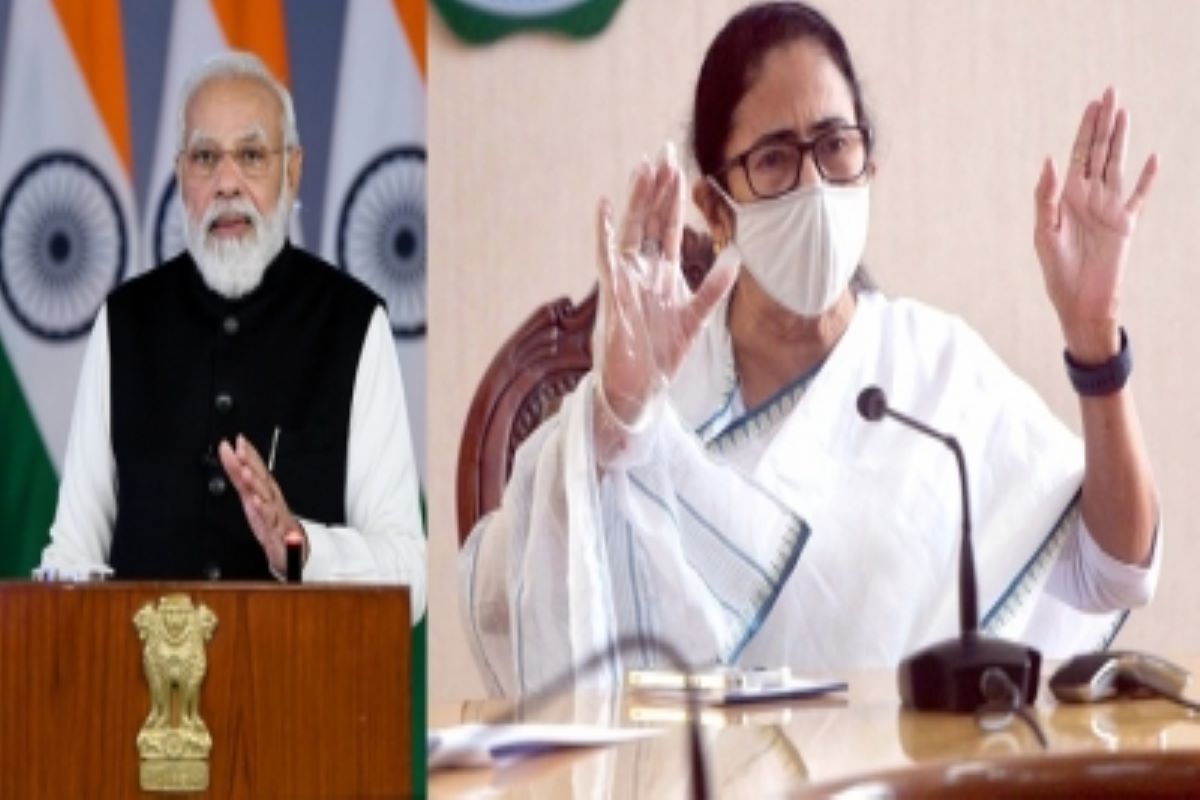LS polls: PM Modi to campaign in Gujarat today
Prime Minister Narendra Modi will address two public meetings in Gujarat's Banaskantha and Sabarkantha, respectively, on Wednesday.

(L-R) PM Narendra Modi, WB CM Mamata Banerjee (IANS photo)
No sooner had the dates for the rural polls to be held in West Bengal next month announced, a war of words began between the state’s ruling party and the opposition parties. Among the
most contentious issues were whether central paramilitary forces would be deployed to ensure a peaceful polling process or whether the state’s police force was adequately equipped. The ruling party insisted on the latter. The Opposition demanded the former. In fact, the very next day of the
announcement, BJP and Congress filed petitions in the Calcutta High Court asking for central forces.
“State police is certainly not enough,” exclaimed CPIM’s Sujan Chakraborty. “It will fall way short of the number of booths the personnel have to man during the polls.”Currently, the West Bengal police comprise 79,032 personnel. The estimated number of booths during the upcoming polls is expected
to not only exceed that figure but exceed by a large number, according to Chakraborty.
There are 3,317 Gram Panchayats in the three-tier rural-government system in West Bengal spread over 23 districts. The total number of Gram Panchayat (the village-level governing body) seats that will be contested is 63,229. The total number of Panchayat Samity (the block-level governing body) seats that will be contested is 9,730 and the total number of Zilla Parishad (district-level governing body) seats that will be contested is 928.
Advertisement
In West Bengal, the Panchayat Polls are given a great deal of importance and are even considered at par with the Parliamentary or Assembly elections. “This was a practice during the three decades of Communist rule whose policy was decentralized governments and more power to the people in the districts,” explains Professor Biswajnath Chakraborty, a political analyst. “West Bengal, more than perhaps some other states, has had a policy of implementing the provisions of the Panchayat Raj with greater priority.”
And the more control that a political party exercised at the ground, that is the number of Panchayat seats held, meant that that party’s chances of securing seats in the other elections would be far greater.
“This is why the Panchayat polls are extremely important for Mamata Banerjee as she heads to the Parliamentary elections next year,” says Professor Chakraborty. Her party does already control the majority of the Panchayats in the state and she doesn’t want to concede any ground locally because she is now trying to recapture ground at the Parliamentary level (BJP’s seats and vote shares had shot up significantly in the last general elections.) The 2023 Panchayat polls for Didi are all about retaining ground in order to recapture it in the Parliamentary polls of 2024.
As far as the Opposition’s insistence on deploying central paramilitary forces during the rural polls is concerned, it has a lot to do with their claim that Trinamool’s fight to protect its turf could come at the cost of “free and fair” elections. “It is not just about the shortage of personnel in comparison to booths which could leave booths vulnerable to manipulation by the party wielding power but it is also about the ‘neutrality’ of the force guarding the booths,” says Professor Chakraborty. “The
Opposition fears that without a neutral watchdog their candidates and their supporters would not be able to register their votes in a free and fair manner.” He points out that violence has often marred elections in West Bengal. “The idea of violence is not new to West Bengal politics whether you look at Naxal Movement or the Communist ideas of armed revolutions. This has unfortunately seeped into the democratic processes including of holding elections.”
The last Panchayat Polls reported “unprecedented” incidents of violence according to the experts. From the time of filing nomination papers when contestants were violently beaten up to the time of actual voting when there was largescale violence. This time too reports of violence are
trickling in. There have been allegations that many would-be contestants are being prevented from filing their nomination papers by political goons. Allegations that Trinamool has perpetrated most of these have been denied with party leaders pointing out that “The most number of nomination
papers filed in the first two days have been those of the Opposition parties including BJP and the Congress,” as said a Trinamool leader.
After a five-day wait (the petition was filed on June 9, the day after the announcement of dates, which was on June 8), yesterday, the division bench of the Calcutta High Court headed by Chief Justice TS Sivagananam, ruled that central forces would indeed be deployed and especially in the seven “sensitive” districts of the state. These districts are East Midnapore, South 24 Paraganas, parts of North 24 Paraganas, Birbhum, Hoogly, Jalpaiguri and Murshidabad.
Advertisement